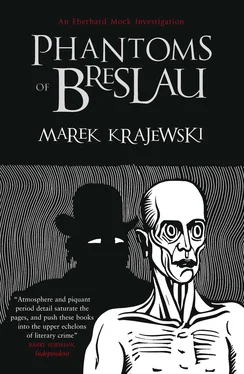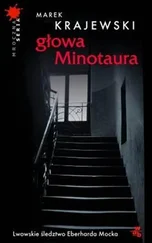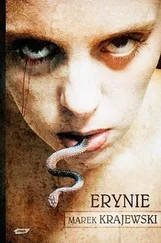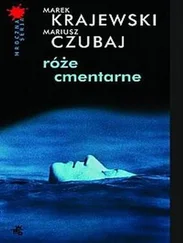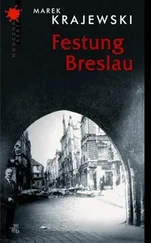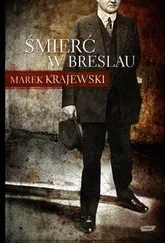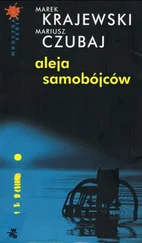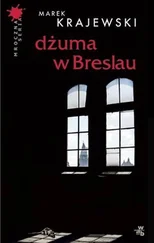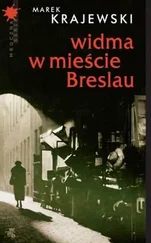Marek Krajewski - Phantoms of Breslau
Здесь есть возможность читать онлайн «Marek Krajewski - Phantoms of Breslau» весь текст электронной книги совершенно бесплатно (целиком полную версию без сокращений). В некоторых случаях можно слушать аудио, скачать через торрент в формате fb2 и присутствует краткое содержание. Жанр: Полицейский детектив, на английском языке. Описание произведения, (предисловие) а так же отзывы посетителей доступны на портале библиотеки ЛибКат.
- Название:Phantoms of Breslau
- Автор:
- Жанр:
- Год:неизвестен
- ISBN:нет данных
- Рейтинг книги:3 / 5. Голосов: 1
-
Избранное:Добавить в избранное
- Отзывы:
-
Ваша оценка:
- 60
- 1
- 2
- 3
- 4
- 5
Phantoms of Breslau: краткое содержание, описание и аннотация
Предлагаем к чтению аннотацию, описание, краткое содержание или предисловие (зависит от того, что написал сам автор книги «Phantoms of Breslau»). Если вы не нашли необходимую информацию о книге — напишите в комментариях, мы постараемся отыскать её.
Phantoms of Breslau — читать онлайн бесплатно полную книгу (весь текст) целиком
Ниже представлен текст книги, разбитый по страницам. Система сохранения места последней прочитанной страницы, позволяет с удобством читать онлайн бесплатно книгу «Phantoms of Breslau», без необходимости каждый раз заново искать на чём Вы остановились. Поставьте закладку, и сможете в любой момент перейти на страницу, на которой закончили чтение.
Интервал:
Закладка:
TWO O’CLOCK IN THE AFTERNOON
Doctor Cornelius Ruhtgard, specialist in sexually transmitted diseases, received patients in his five-room apartment at Landsbergstrasse 8, near South Park, on Wednesdays. The apartment occupied the entire first floor of the detached tenement building, so its windows looked out in all four directions. From one of the bathrooms stretched a view of the park, which was now being admired by a young woman pulling on a long-legged undergarment after her thorough examination. Doctor Ruhtgard sat in his surgery writing out a prescription for Salvarsal. He smiled as he thought of her earnest protestations that over the past year, that is, ever since the death of her husband in the war, she had not had intercourse. The state of her health clearly indicated otherwise, and the time she last surrendered to the above-mentioned act — with all its consequences — could be established to within a few days. Pretending to take her at her word, he walked her to the door, then returned to his surgery and gazed out of the window. His patient approached a smart Daimler parked by a lamp post. She did not get into the car but, clearly upset, explained something to the person inside. Ruhtgard knew what would happen next; he could almost hear the infected man yelling with fury and the tyres squealing as the automobile violently pulled away.
He would certainly have heard the shouts had it not been for the racket and piano cacophony coming from the parlour adjacent to the surgery. He wrenched open the door and a singular sight met his eyes: two young men were sitting at the piano, their four hands thumping the delicate keyboard on which his wife, who had died a few years earlier, had once painted the crystalline landscapes of the Goldberg Variations and executed the precise strophes of Das wohltemperierte Klavier . Clasped around the waist by some scoundrel, Doctor Ruhtgard’s daughter, nineteen-year-old Christel, was prancing beside the piano. Both she and her partner were pulling silly faces, evidence that these barbaric chords were giving them unutterable pleasure.
Ruhtgard smelled sweat, an odour he loathed almost as much as the lice which had tormented him only a year earlier on the Eastern Front, or the pathogens of syphilis which devastated the bodies of his patients. The odour was strong, and he swiftly discovered its source: dark stains beneath the arms of one of the men at the piano. Both players noticed the doctor at once and leaped to their feet, bowing politely. The dancer stopped his prancing, bowed and clicked his heels. Christel stood still, smiling and flushed from movements which only a blind man would have called dancing. But Doctor Ruhtgard was neither blind nor deprived of the sense of smell. And so his reaction was violent.
“What are all these savage dances?” he yelled. “What’s all this roaring like wild animals? Goodbye, gentlemen! Leave at once!”
“We’re sorry, Papa,” Christel said, frightened by his outburst. “We were just fooling around a bit …”
“Quiet, please” — the doctor was short of breath — “Go to your room. And to you, gentlemen, I bid farewell! Do I have to repeat myself?”
The young men quickly vanished, unlike the odour emanating from them. Ruhtgard opened a window and with relief drew in the fresh air suffused with the scent of late summer. He sat down in an armchair and looked at Christel. She was so unlike his wife. His daughter did not have the warmth, softness and fragility he had so loved. Christel was rebellious, sporty, angular, strong and independent. “Probably deflowered already.” The thought pained him as he imagining her lying beneath the male with the sour smell.
“Christel,” he said as gently as he could. “The parlour is not a circus. How could you allow those stinking Hereros to demolish the piano on which your mother played?”
“And what would you say, Papa,” she snorted, “if one of those savages was to become your son-in-law?”
Without waiting for an answer, she went to her room; Ruhtgard frowned and lit a cigar. He cast an eye around the parlour to seek solace in the beauty of the apartment he had been renting fully furnished for a year now, for the considerable sum of a thousand marks a month. Five rooms and two bathrooms. Tomes over a hundred years old. Eighteenth-century paintings. Turkish rugs and Arabian carpets. And amongst these works of art his sporty, baby daughter, with a dull-witted bull who knew nothing but how to thrust himself between her open legs. Ruhtgard smoked his cigar and paced the apartment. He had to talk to somebody. Then he remembered that, apart from his daughter, his servant and himself there was someone else in the apartment. Someone he trusted completely. He knocked on the door of the second bathroom and, hearing a strident “Come in!”, he entered. In the bath spread with a sheet, lay a well-built, dark-haired man with a cigarette between his teeth. Criminal Assistant Eberhard Mock.
BRESLAU, THAT SAME SEPTEMBER 3RD, 1919
THREE O’CLOCK IN THE AFTERNOON
Mock and Ruhtgard sat at the chessboard devising clever strategies for the opening. Mock picked up a pawn from e2 and placed it on e4.
“You’ve got it made, Ebi,” muttered Ruhtgard as he moved a pawn from b7 to b5. “You didn’t go to work after yesterday’s drinking binge … Nothing’s going to happen to you …”
“I did go to work, but not for as long as usual. Apart from talking to the psychologist I did nothing for five hours. It’s to do with the case I’m working on.” Mock looked miserable. “I’m not going to talk about it. Tell me” he said, suddenly coming to life, “is the thing I came to see you about serious? Did I catch anything from that girl?”
“Itching with no other symptoms” — the doctor smiled — “doesn’t mean anything. It might be nothing more than a desperate appeal for hygiene.”
“If you lived where I do” — Mock brought his knight into action — “you wouldn’t be making daily offerings to Hygiea either.”
“Well said. And what about your offerings to Hypnos?”
“I’m not sleeping.” Mock lost the desire to juggle with mythology. “I’m having nightmares. That’s why I drink or take up with harlots. When I’m pissed, I don’t dream at all. When I’m with a whore, I don’t sleep at home. And I only get nightmares at home. Unfortunately, I can’t move out because my father doesn’t want to. The only two friends he has live there: a retired postman and his dog.”
“Sorry for poking my nose into something that’s not my business, but why don’t you ask Franz to take your father in, at least for a while?”
“My father’s difficult. Irmgard, Franz’s wife, is even more difficult … But I don’t need to tell you that. Quietly and gracefully, she’s sucking away at my brother’s blood. Franz drinks and my ten-year-old nephew, Erwin, is constantly ill. That explains everything.”
“Yes, that’s clear enough.” Ruhtgard attacked the knight with his bishop. “You know what, Ebi? I’ve been thinking about your nightmares and a simple solution occurred to me. Don’t eat supper and abstain from women for a time. I stick to a vegetarian diet, I don’t eat anything at night and I abstain from sex. Does that surprise you? It’s not difficult in my profession. I’ve seen my fair share of syphilitic pubes. Apart from that, I’m seven years older than you. We’ll see whether you’re such a stud at forty-three … If I do have dreams, they’re only pleasantly erotic ones. And another thing … You wouldn’t have to worry about any itching, or spend your time soaking in my bath. Do you know how much I have to pay the caretaker to heat the water?” He smiled. “Now, tell me honestly: how much did you eat last night?”
Читать дальшеИнтервал:
Закладка:
Похожие книги на «Phantoms of Breslau»
Представляем Вашему вниманию похожие книги на «Phantoms of Breslau» списком для выбора. Мы отобрали схожую по названию и смыслу литературу в надежде предоставить читателям больше вариантов отыскать новые, интересные, ещё непрочитанные произведения.
Обсуждение, отзывы о книге «Phantoms of Breslau» и просто собственные мнения читателей. Оставьте ваши комментарии, напишите, что Вы думаете о произведении, его смысле или главных героях. Укажите что конкретно понравилось, а что нет, и почему Вы так считаете.
